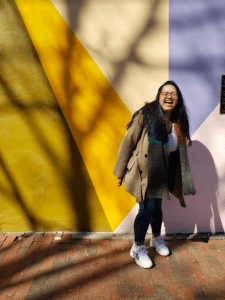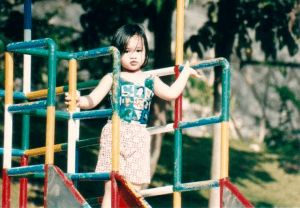Andrea Swiedom Staff Reporter
When people ask senior Samantha Rose Aloba Melgar where she’s from, they’re rarely satisfied with her initial response of the Gardiner/Augusta area. Often, they ask her again with an emphasis on from. “I feel like I have to explain because I don’t belong to one place. To me, where you are from is such a heavy question,” Aloba Melgar said. “I assume they’re asking where you are originally from and I don’t know. I am just used to telling people the Philippines-Maine-Texas-Maine story.”
Aloba Melgar moved to Augusta with her mother and older brother from Cebu City, Cebu, Philippines when she was nine years old. Her mother had remarried a man from Maine and they arrived during a Jan. snowstorm. “It was my first experience of snow because in the Philippines there’s only a wet and dry season, and I was just looking around really fascinated,” Aloba Melgar said.
While she’s still fascinated by snow, she admitted that that’s about as far as her appreciation goes for Maine winters. “I like it when it first initially snows,” Aloba Melgar said with her fingers dancing in mid-air to mimic snow falling. “But the cold that comes with it and when it gets dirty…” she trailed off shaking her head in discomfort.
She experienced a short break from New England winters when she was 11 years old after her mother’s divorce led the family to move to El Paso, Texas where they reconnected with extended family members. For the first time since living in the United States, Aloba Melgar was amongst Filipino Americans. “There is a community here in Maine, but we’re not really a part of it. It was nice in Texas to get to know them and not have it be as scattered as it is here in Maine,” she said.
Exposure to Filipino culture in Texas brought back nostalgic memories of Aloba Melgar’s early childhood in Cebu where large family gatherings consistently took place several times throughout the month. “I do miss the physical gathering of us together,” she said. “Sometimes we would go to the beach. Mostly, we would either go to someone’s house or go to a restaurant together.”
Aloba Melgar’s face lit up as she described the strong tradition surrounding food at family reunions and one of the dishes her mom still makes regularly at home called pancit, a noodle dish similar to chow mein that is quickly fried with vegetables and seasoned with soy sauce.
“Food is a big thing in the Philippines, we love to share food. We just love food, and I think that transcends beyond any language,” Aloba Melgar said. Although, she admitted that she has struggled to carry on her culture’s culinary traditions in an attempt to avoid washing dishes.
While in El Paso, Aloba Melgar joined a Christian church and was baptized in the Protestant faith while her mother remained Roman Catholic, the primary religion in the Philippines. While this was not a dramatic change, it does demonstrate how Aloba Melgar’s identity often reflects her dual origins of the United States and the Philippines.
“There are views that formed while I grew up here, and there are views that stayed with me that I learned from the Philippines. I’ve noticed in Western culture, you guys like independence very much and by the time you’re 18, you’re expected to go off,” she said. “Usually in the Philippines, for my family anyway, you stay with the family and usually the older sibling takes care of the parents.”
Aloba Melgar considers herself Generation 1.5, which refers to immigrants who moved to the U.S. as adolescents. “You’re not really a generation one, and you’re not a generation two; you didn’t entirely grow up in the States,” she said. “So you are both, battling with two identities.”
Aloba Melgar still has vivid memories of her childhood in the Philippines and how certain aspects were ironically unaffected by place. She played with Bratz dolls and princess Barbies and binge-watched Disney movies.
But she also reflected on aspects of her childhood that were unique to the society and culture in the Philippines. “We would play hide-and-go-seek in the woods with a lot of bugs or go into abandoned houses,” she said. “I could say, ‘Mom, I’m gonna be gone and I will come back later,’ and it was usually fine. I don’t think it was dangerous, there was never an idea that there was a dangerous situation.”
Aloba Melgar also remembered the cost of education and the strain it had on her mother who was determined to keep her and her older brother in school.
“We were a middle class family in the Philippines, but there was a time when my mom’s salary was not enough, and my mom had to pick between me and my brother,” she said. “My mother sat me down once and told me that I might have to stop school, and I started crying. Luckily that didn’t happen. My mom moved me to a different school that was cheaper.”
Aloba Melgar’s family spent a short year and a half in El Paso before returning to Maine which seemed to be beckoning them back. “I think we just met the right people, and that really contributed to why we came back and stayed here.”
After graduating from Cony High School in Augusta, Aloba Melgar enrolled at UMF to pursue psychology after breaking the news to her mother that she would not be going to school for nursing. “I was going to go to USM, but then out of nowhere, I realized that I didn’t want to become a nurse because that is more of what my mom pushed me to do. Nursing is actually a Filipino stereotype,” she said, chuckling.
Her mother supported her interest in counseling, but as Aloba Melgar studied psychology she found herself more drawn to social work. She also realized that her mother had imprinted some career ideas on her that were still intriguing such as working for the United Nations or the Peace Corps.
When Aloba Melgar was still considering nursing in high school, she always imagined traveling for work. She started exploring international social work options and that’s when she learned that the Peace Corps was essentially just that. “I wanted more experience before going into grad school and I was just exhausted with academia.”
Aloba Melgar applied to the Peace Corps last semester and will be returning to the Philippines in early July for the first time since she was nine years old to work as a youth development facilitator.
“I am going to be working with elementary age to even up to college age people, just helping them with education, to access resources, with positive identity and vocational skills, with critical thinking and healthy lifestyle activities, with mentoring and workshops.”
For the next two years, Aloba Melgar will be reintroducing herself to a place that she considers to be a significant part of her identity. “I want to explore and go back to where I started. I just want to see the changes,” she said. “I want to make connections again with the culture and see how I will react to it now that I’ve spent more than half my life here in the U.S.”

